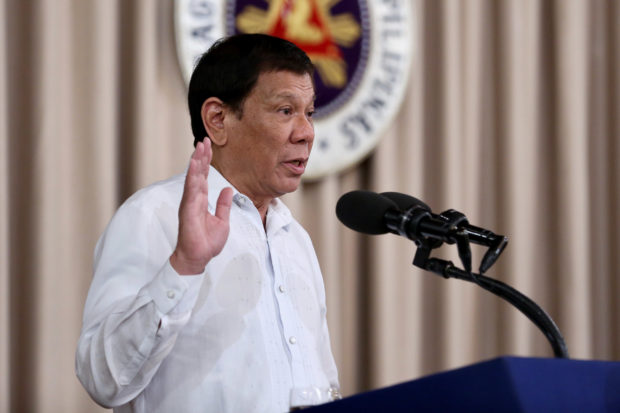New Duterte matrix shows Maute drug links

President Rodrigo Duterte. ACE MORANDANTE / Presidential Photographers Division (FILE)
Published: 1:15 p.m., Sept. 23, 2017 | Updated: 12:22 a.m., Sept. 24, 2017
DAVAO CITY—President Rodrigo Duterte on Friday showed to reporters a new matrix with the names of and connections between drug personalities in Lanao del Sur province and other areas, saying these were the people who had helped the Islamic State (IS)-inspired terrorists survive a military onslaught in Marawi City.
Mr. Duterte said the politicians and other personalities in the matrix funneled funds to the Maute group and their allies before and during the battle, which entered its fourth month on Saturday.
“I have something for you tonight. I’ll just pass it on to—Listahan ng… ‘yung paano (the list…how it’s done),” Mr. Duterte said, handing out the matrix to reporters over dinner here.
“That’s for public consumption already—how they operated the drug campaign in Marawi and the entire of Mindanao,” he added.
Article continues after this advertisementBased on 3-month intel
Article continues after this advertisementThe President said the operation of the group and the others linked to the drug operation was the reason “I said Mindanao and the Visayas almost fell into the hands of [a] narcostate.”
“Luzon remains a volatile area,” he said.
The matrix, which included the name Parojinog, supposedly that of slain Ozamiz City Mayor Reynaldo, was the product of “intelligence for the last three months or two.”
Parojinog was killed along with his wife Susan, brother Octavio Jr., sister Mona and 11 others in a police raid in Ozamiz on July 30.
The President said he was considering giving his “narcolist” to priests and bishops so they could help talk to the drug personalities “who are their parishioners.”
“These priests, they easily condemn [the government’s war on drugs]. You [priests] go to these people and tell them to stop already. You have the money to do that. That’s your job [also],” he said.
Mr. Duterte said the matrix was prepared after government forces managed “to penetrate the … insides of the entrails of the city (Marawi).”
The names included former Marawi mayor Solitario Ali, his brother Fahad Salic, and his son Arafat—three of the men suspected by the military of helping the Maute group prepare for a long battle in the city.
Driving force
The President said the operation of the Lanao del Sur group, which included incumbent mayors, councilors and village chiefs, extended to areas as far as Quiapo in Manila and Novaliches in Quezon City.
“Until now, [the Maute group and their allies] are… they never run out of ordnance—explosives, ammunition and all,” Mr. Duterte said.
“You know, in the illegal drug trade, whether or not you want to believe it, always the driving force is greed and power, money,” he added.
He said he would determine the extent of the drug operation that allowed the terrorists to survive this long in Marawi.
“Until now, it’s still (not clear). It remains to be something, like they are just there fighting. But there were also a lot of Arabs fighting,” he added.
The President dismissed the Maute group’s claim that it was fighting for Islam: “That’s terrorism, it’s not Islam. It is not the work of a believer of Islam. I should know that. You know my roots.”
Stressing that “nobody wins” in battle, he said the military’s final offensive in Marawi was not directed against Muslims.
‘Alien ideology’
“I’d be the last person to condemn the Moro people,” Mr. Duterte said, adding that his government continued to talk with Moro rebel leaders Nur Misuari of the Moro National Liberation Front and Murad Ebrahim of the Moro Islamic Liberation Front.
“Just like in Marawi, we will never win there. They’re all Filipinos. [But it was] because of an alien ideology, that of the IS, that drove them to some kind of a devil’s den.”
Expounding on his plan to ask priests and bishops for help in his war on drugs, Mr. Duterte said the clergy also needed to know who among their parishioners were into drugs.
“They (drug personalities) are alive. You talk to them and tell them they would end up in a very serious situation if they continued,” he said. “Also talk to the barangay captains (involved in drugs).”
The Catholic Church has been highly critical of the administration’s antidrug campaign, which has claimed the lives of thousands.